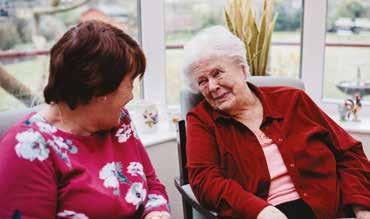
8 minute read
Important information
Finding care in your area
Looking for care in your area? Want to know the quality rating of providers you’re considering? Care Choices, publisher of this Directory, has a website providing comprehensive details of care providers as well as essential information.
You can search by postcode, county or region for care homes, care homes with nursing and home care providers that meet your needs across the country.
Your search can be refined by the type of care you are looking for and the results can be emailed to you. They can also be saved and emailed to others.
The website includes detailed information for each care provider, including the address, phone number How solicitors can help A solicitor can give you impartial advice about wills, gifts, estate planning and Powers of Attorney. Some can also offer guidance on immediate and long-term care plans, ensuring (if applicable) the NHS has made the correct contribution to your fees. Lasting Powers of Attorney (LPAs) allow you to appoint someone you trust to make decisions about your personal welfare, including healthcare and consent to medical treatment, and/or your property and financial affairs. An LPA is only valid once registered with the Office of the Public Guardian. It allows a person of your choice to make decisions on your behalf at a time when you may be unable. The Court of Protection can issue Orders directing the management of a person’s property and financial affairs if they are incapable of managing their own affairs and should they not have an LPA. The Court procedure is presently very slow, and the fees are quite expensive so preparing an LPA is always advisable, providing you have somebody sufficiently trustworthy to appoint as your attorney. and the service’s latest CQC inspection report and rating (see page 49), indicating the quality of care provided.
You can also view an electronic version of this Directory on the site and have it read to you by using the ‘Recite Me’ function. Visit
www.carechoices.co.uk
An ‘advance directive’ allows you to communicate your wishes in respect of future medical treatment but it is not legally binding. You may instead wish to make a living will, properly known as an ‘advance decision’, setting out treatment that you do not want to receive in specified circumstances, which would legally have to be followed, even if you die as a result.
Any proposed gift out of your estate needs careful consideration of the benefits, risks and implications, particularly on any future liability for care costs or tax liability.
If you don’t have your own solicitor, ask family or friends for their recommendations. Contact several firms, explain your situation and ask for an estimate of cost and an idea of timescales involved.
Many firms will make home visits if necessary and will adapt their communications to meet your needs. It’s important to find a solicitor who specialises in this area of the law. Citizens Advice offers an information service and may be able to recommend solicitors in your area.
You have the right to make comments, compliments or complaints about any care or support services you receive. You should feel free to make comments and suggestions about possible improvements to your surroundings and the services provided.
If you want to make a complaint, you should feel able to complain about any aspect of your support which affects your happiness or comfort. This might be anything from the way you are treated by staff to the quality of the food you are served.
Making a complaint should not be made difficult for you and should not affect the standard of care that you receive whether in your own home or in a care home or care home with nursing. Care services are required under national essential standards of quality and safety to have a simple and easy to use complaints procedure.
If you are concerned about the care that you, a friend or a relative are receiving, it makes sense to speak to the manager of the service about your concerns before you take any further action. The problem may be resolved quite easily once they are made aware of it. However, if you need to make a formal complaint, you should initially contact the registered owners of the service. They have a duty Health and social care services must be registered to show that they meet a set of standards. The Care Quality Commission (CQC) is the independent regulator of health and social care in England. It registers care providers and inspects and rates services. When things go wrong, the CQC can also take action to protect people who use services. After an inspection of a care home or home care agency, the CQC publishes a report of what it found. The report looks at how well the service meets the CQC’s five key questions: Is the service safe? Effective? Caring? Responsive to people’s needs? Well-led? If you have a complaint about a breach of regulations, contact your local office of the Care Quality Commission (see below for more information about the CQC).
If your local authority has arranged and funded a place for you in a care home or has contributed to a home care service, another option is to speak to your social care department. In Buckinghamshire, call 01296 387844 or write to Compliments and Complaints Team, Buckinghamshire Council, Walton Street Offices, Walton Street, Aylesbury HP20 1UA. For residents in Milton Keynes, call 01908 691691 or email
customerservices@milton-keynes.gov.uk
If you have been unable to resolve your complaint, you can contact the Local Government and Social Care Ombudsman on 0300 061 0614 and ask them to assist you. The Local Government and Social Care Ombudsman looks at complaints about councils and some other authorities and organisations, including adult social care providers (such as care homes and home care providers). It is a free service and its job is to investigate complaints in a fair and independent
Inspecting and regulating care services
way. Each care home and home care agency will get an overall rating of outstanding, good, requires improvement or inadequate. It will also get ratings for each key question. The ratings mean you can easily see where a service is performing well, and where it needs to improve.
It’s always a good idea to check inspection reports and ratings when choosing a care service. You can find reports and ratings on the CQC’s website (www.cqc.org.uk ). Care providers must also display their latest rating at their premises and on their website.
You can also tell the CQC about your experiences of care – good or bad. It can use your information to see where it should inspect next, and what to look out for when it does. If you want to share
Tel: 03000 616161 You can choose a care home outside your home county. You may want to be closer to friends, family members or you may want to relocate to another part of the country. If your care home place is state-funded, speak to the local authority about who is responsible for your care fees, especially if you choose a care home in another region. Any home you choose must be suitable for your assessed needs and comply with Vulnerable adults may experience abuse, neglect and worse. A vulnerable adult is a person aged 18 years or over who may be unable to take care of themselves or protect themselves from harm or from being exploited.
What is adult abuse?
Abuse is mistreatment that violates a person’s human and civil rights. The abuse can vary from treating someone with disrespect in a way which significantly affects the person’s quality of life, to causing actual physical suffering. It can happen anywhere – at home, in a care home or a care home with nursing, a hospital, in the workplace, at a day centre or educational establishment, in supported housing or in the street. Forms of abuse could be physical, sexual, psychological, emotional or financial. It could also cover the issues of modern slavery, self-neglect and institutional abuse – where the abuse affects more than one person within an organisation and is not addressed by the service’s management.
Who might be causing the abuse?
The person who is responsible for the abuse may be known to the person abused and could be: • a care worker or volunteer; • a health worker, social care or other worker; Email: enquiries@cqc.org.uk Web: www.cqc.org.uk Write to: The Care Quality Commission, Citygate,
Out-of-county care
Gallowgate, Newcastle upon Tyne NE1 4PA the paying authority’s terms and conditions.
You should seek further advice before making your decision.
For help finding care providers in Buckinghamshire, Milton Keynes and in other regions, visit this Directory’s website at www.carechoices.co.uk to search for care that
Protecting vulnerable adults
meets your requirements. a relative, friend or neighbour; another resident or service user; an occasional visitor or someone who is providing a service; or someone who deliberately exploits vulnerable people.
If you think someone is being abused, call the Safeguarding Adults Team in Buckinghamshire on 0800 137 915, or on 01908 253772 in Milton Keynes. Your concerns will be taken seriously and will receive prompt attention, advice and support.
In Buckinghamshire, the Safeguarding Adults Team is available from 9.00am to 5.30pm, Monday to Thursday; and 9.00am to 5.00pm on Friday. In Milton Keynes, the Safeguarding Adults Team is available from 8.30am to 5.00pm, Monday to Friday. Outside these hours:
call the Emergency Duty team in Buckinghamshire on 0800 999 7677, or on 01908 725005 in Milton Keynes;
leave a message on the answerphone; or
call the police on 101, or 999 if it is an emergency.
If the abuse is also a crime such as assault, racial harassment, rape or theft you should involve the police to prevent someone else from being abused.









